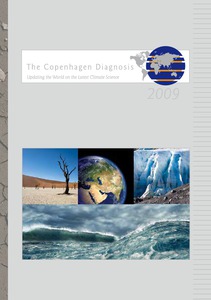The Copenhagen diagnosis, 2009. Updating the world on the latest climate science
The most significant recent climate change findings are: Surging greenhouse gas emissions: Global carbon dioxide emissions from fossil fuels in 2008 were 40% higher than those in 1990. Even if global emission rates are stabilized at present-day levels, just 20 more years of emissions would give a 25...
| Institution: | ETUI-European Trade Union Institute |
|---|---|
| Format: | TEXT |
| Language: | English |
| Published: |
Sydney
2009
UNSW Climate Change Research Centre |
| Subjects: | |
| Online Access: | https://www.labourline.org/KENTIKA-19178215124919964979-The-Copenhagen-diagnosis,-2009.htm |
| Summary: | The most significant recent climate change findings are: Surging greenhouse gas emissions: Global carbon dioxide emissions from fossil fuels in 2008 were 40% higher than those in 1990. Even if global emission rates are stabilized at present-day levels, just 20 more years of emissions would give a 25% probability that warming exceeds 2°C, even with zero emissions after 2030. Every year of delayed action increases the chances of exceeding 2°C warming. Recent global temperatures demonstrate human-induced warming: Over the past 25 years temperatures have increased at a rate of 0.19°C per decade, in very good agreement with predictions based on greenhouse gas increases. Even over the past ten years, despite a decrease in solar forcing, the trend continues to be one of warming. Natural, short-term fluctuations are occurring as usual, but there have been no significant changes in the underlying warming trend. Acceleration of melting of ice-sheets, glaciers and ice-caps: A wide array of satellite and ice measurements now demonstrate beyond doubt that both the Greenland and Antarctic ice-sheets are losing mass at an increasing rate. Melting of glaciers and ice-caps in other parts of the world has also accelerated since 1990. [...]" |
|---|---|
| Physical Description: | 62 p. Digital |

